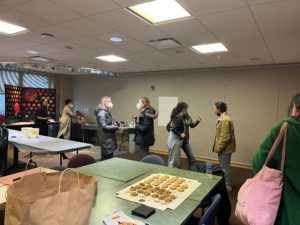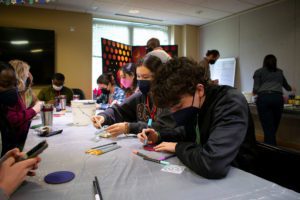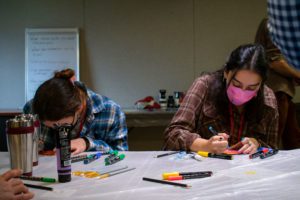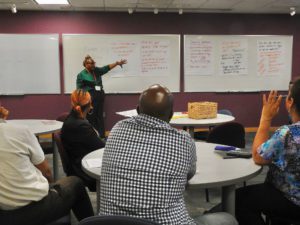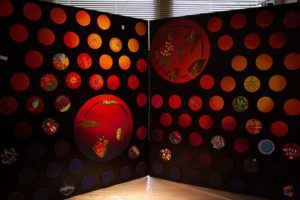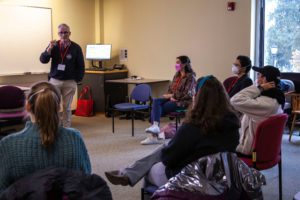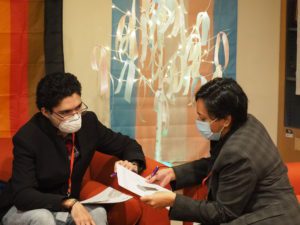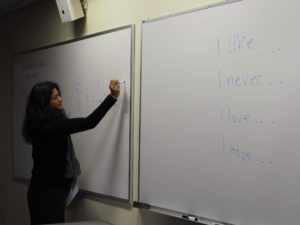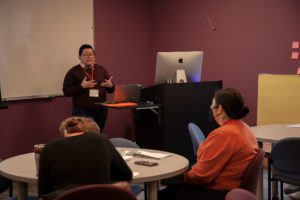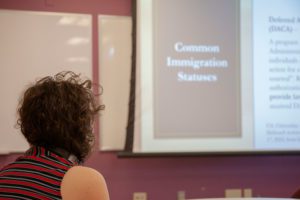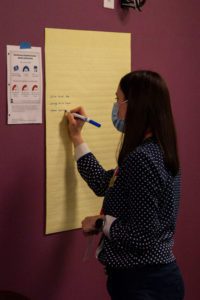The THRIVE Initiative—whose acronym stands for Truth, Healing, Resiliency, Inclusion, and Equity—looks to bring long-term and sustainable change to Haverford’s campus and culture through engagement and conversation. One way the program works to inspire that change is by bringing people together.
On January 21, THRIVE hosted its second annual conference, with the theme of Reclaiming Our Stories. The all-day event brought more than 50 people, from both Haverford and the local community, to Stokes Hall to discuss equity, antiracism, reclamation, and the stories of their lives and heritages.
This year’s event was a follow-up to last spring’s inaugural conference, From Harm to Healing. The Reclaiming Our Stories theme invited attendees to rewrite their stories in a loving and nurturing environment. In particular, the conference welcomed attendees to reclaim parts of their identities and stories which had been rejected in the past. To help them in that work, the conference featured speakers and workshops on themes of identity and storytelling.
In her keynote address, Michelle Angela Ortiz, an artist, muralist, filmmaker, and educator whose art spotlights cultures which have often been marginalized and overshadowed, gave a talk titled “The Art of Storytelling.” In it, she explained how she used her talents to highlight silenced stories and challenged listeners to do the same.
After Ortiz’s presentation, participants were given the opportunity to attend one of three concurrent workshops, as part of the conference’s first block. Nimisha Ladva, a visiting assistant professor of writing and oral communication specialist at Haverford, gave workshop titled Storytelling Matters. Ladva, who is also an award-winning storyteller, discussed how to more effectively tell a story and speak publicly, offering useful skills regardless of the topic. Ahyana King, director of Haverford’s Office of Race and Ethnicity Education, offered The Stories We Tell Ourselves: If Our Social Identities Had the Mic. The workshop gave attendees a chance to discuss the stories they tell about themselves, and how they might revise and challenge any preconceived notions of themselves. In her presentation Making Home Movies: Burma and Bhutan to South Philadelphia Stories, artist Shira Walinsky discussed her work in making films depicting the lives of people from Nepal, Bhutan, and Burma.
After a lunch break, afternoon sessions included a discussion of how governmental policies can negatively impact the lives of undocumented students, and how their colleges and communities can better support them. In addition, Walter Hjelt Sullivan ’82, Haverford’s director of Quaker Affairs led a discussion on Appreciating the Many Roles of Social Change, which focused on how everyone can work for social change in their own style, suited to their particular personality.
The conference concluded with two more workshop options Centering Our Stories: An Ongoing Struggle for a Misunderstood People, led by Shimaa Eid, education director at Philadelphia’s El-Bustan Seeds of Culture, looked to uplift marginalized voices, including Arab, Middle Eastern, and North African people. And in Take It Back: Reclaiming Our Stories, radio talk show host, writer, blogger, and activist Lenée Voss offered the opportunity for attendees to rewrite their stories based on their own lived experiences rather than being defined by others.
Throughout day, Ortiz and fellow visual artist Salina Almanzar offered an ongoing activity, Reclaiming Our Stories, which gave participants the chance to create art that reflected the stories they wanted to share. Their creations, each on a four-inch diameter circle, became a collective art project, encompassing the lived experiences of the conference’s attendees.
Emily Johnson, director of the Marilou Allen Office of Service & Community Collaboration and one of the conference’s coordinators, was pleased with the event’s success. “Last year was a pilot half day conference, and this year we transitioned to the full day program. We learned a lot last year about the timing of workshops, the space we used, and more—especially thanks to the feedback of those who attended,” she said. “This year went very smoothly!”
The THRIVE initiative, part of the Dean’s Office and Student Life, was developed through collaborative work across the campus and made possible through a $250,000 gift from a member of Haverford’s Class of 1996. THRIVE’s work includes investing in workshops and webinars as a means for members of the Haverford community to better understand one another and themselves. Modeled on the W.K. Kellogg Foundation’s Truth, Racial Healing and Transformation Program, THRIVE is envisioned as a multi-year project that is firm in its commitment to change through constructive engagement.
A full video of the conference’s keynote address, Michelle Angela Ortiz, is available below.
The full program of the 2023 THRIVE Conference is available here.

